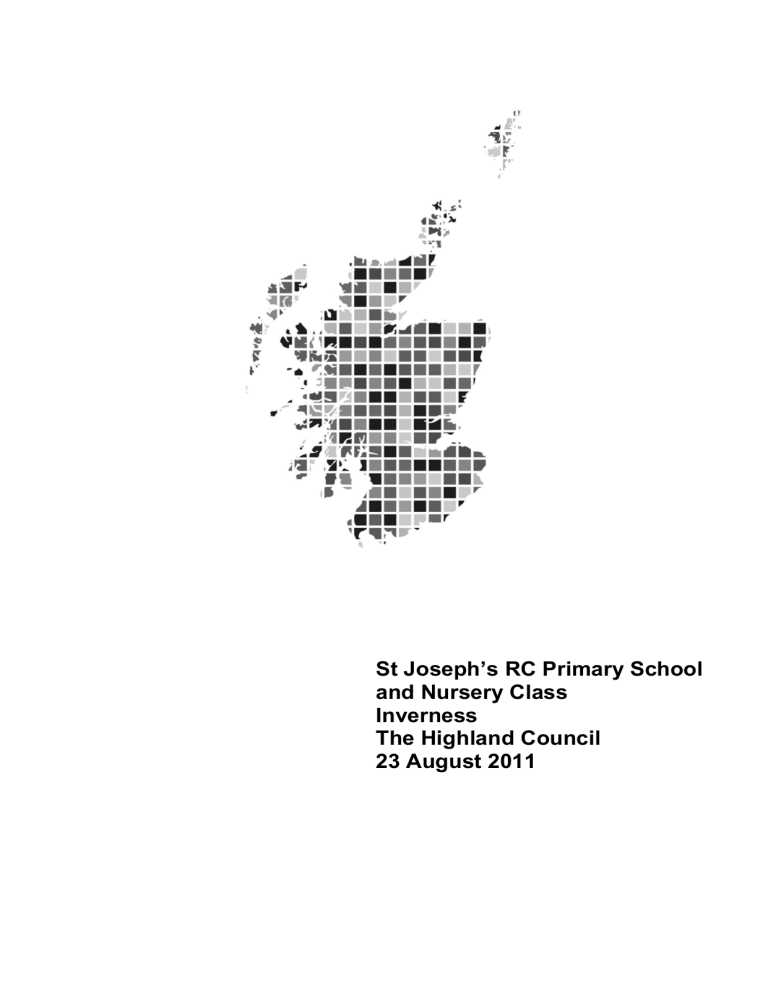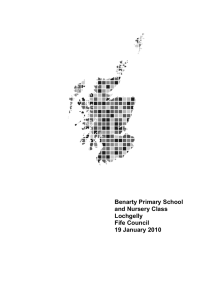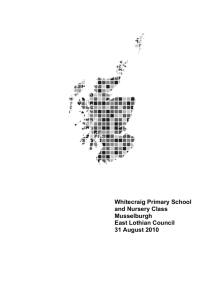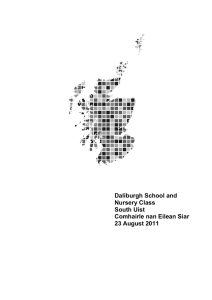St Joseph’s RC Primary School and Nursery Class Inverness

St Joseph’s RC Primary School and Nursery Class
Inverness
The Highland Council
23 August 2011
HM Inspectorate of Education (HMIE) inspects schools in order to let parents
1
, children and the local community know whether their school
2
provides a good education. Inspectors also discuss with school staff how they can improve the quality of education.
At the beginning of the inspection, we ask the headteacher and staff about the strengths of the school, what needs to improve, and how they know. We use the information they give us to help us plan what we are going to look at. During the inspection, we go into classes and join other activities in which children are involved. We also gather the views of children, parents, staff and members of the local community. We find their views very helpful and use them together with the other information we have collected to arrive at our view of the quality of education.
This report tells you what we found during the inspection and the quality of education in the school. We describe how well children are doing, how good the school is at helping them to learn and how well it cares for them. We comment on how well staff, parents and children work together and how they go about improving the school. We also comment on how well the school works with other groups in the community, including services which support children. Finally, we focus on how well the school is led and how staff help the school achieve its aims.
If you would like to learn more about our inspection of the school, please visit www.hmie.gov.uk. Here you can find analyses of questionnaire returns from children, parents and staff. We will not provide questionnaire analyses where the numbers of returns are so small that they could identify individuals.
1
Throughout this report, the term ‘parents’ should be taken to include foster carers,
2 residential care staff and carers who are relatives or friends.
The term ‘school’ includes the nursery class or classes where appropriate.
Contents
1. The school
2. Particular strengths of the school
3. How well do children learn and achieve?
4. How well do staff work with others to support children’s learning?
5. Are staff and children actively involved in improving their school community?
6. Does the school have high expectations of all children?
7. Does the school have a clear sense of direction?
8. What happens next?
1. The school
St Joseph’s RC Primary School is a denominational school with a non-denominational nursery class. The school is the only Roman
Catholic (RC) denominational school in Inverness and serves all parts of the city. The roll was 195, including 40 children in the nursery class, when the inspection was carried out in May 2011. The school draws just over a quarter of the roll from placing requests. Children’s attendance was below the national average in 2009/2010. The school has recently experienced a period of instability in staffing.
1
2. Particular strengths of the school
•
Children who are confident and keen to learn and achieve.
•
Teamwork of all staff, led by the headteacher, in securing an ethos of inclusion.
•
The commitment of all staff to the care and welfare of every child.
•
The partnerships with the church and parents to support children’s development and wellbeing.
3.
How well do children learn and achieve?
Learning and achievement
Across the school, almost all children are enthusiastic in their learning and behave well. They recognise that staff know them well and that they are valued. In the nursery, children are confident, relaxed and enjoy their learning. They are engaged in a valuable range of play activities in which they are making decisions. At the primary stages, almost all children work well independently, in pairs and together in small groups. Children are increasingly demonstrating good skills as learners through the use of peer and self-assessment. They can describe what they are good at and what they need to do to improve their writing. As yet, children do not always receive high-quality comments about their work in other areas of the curriculum to help them improve their learning. At all stages, children make use of information and communications technology (ICT) to present talks and for research. Children need further opportunities to use ICT to support and enrich their learning. Children feel safe and understand how the school helps them to stay healthy.
2
At all stages, children experience success to build their self esteem.
The school provides a wide range of out-of-school hours clubs. These include art, homework and sports. Across the school, children have a secure understanding of the environment. As a result, the school has an Eco-Schools Scotland Green Flag. Children develop their creative and performing skills by taking part in competitions at the Inverness
Musical Festival. As part of the celebrations for Burns’ night, children staged a play, recited poems and composed a piece of music,
The St Joseph’s Jig. All children are involved in whole-school shows.
Children have a very good understanding of their responsibilities towards others. They take on roles in the school such as house captains and buddies. The school supports a range of charities for example, Missio and Highland Hospice.
In the nursery class, children are making good progress in developing early language and mathematical skills. Most listen well, enjoy stories and take part effectively in conversations with friends and staff.
Children are beginning to explore early writing and a few are aware of letters and sounds. During play, most children are using appropriate mathematical language. They can count to ten. In the primary classes, most children achieve appropriate national standards in reading, writing and mathematics. Attainment in mathematics has risen steadily in recent years. There is now a clearer trend of improvement emerging in reading and writing. Children who require additional support, including those for whom English is an additional language, are making appropriate progress. Almost all children’s skills in listening are developing well. Children express their ideas and opinions clearly and with confidence. At P7, many use a very good range of vocabulary. By P7, children enjoy reading for pleasure and can talk confidently about their favourite books and authors. Children benefit from recent improvements to the programmes for writing. At all stages, children write in a range of situations. Some children’s writing is of a high-quality. In mathematics, most children perform number calculations well but they are not sufficiently accurate in mental calculations. All children have gained experience in handling money as a result of a money week. Children in P7 are able to talk about the use of credit cards and interest rates. At all stages, children are
3
becoming more experienced in handling data. Across the stages, children are needing to develop their confidence in using appropriate strategies for solving mathematical problems. At the upper stages, children have a good awareness of a variety of two-dimensional shapes and three-dimensional objects.
Curriculum and meeting learning needs
Through effective collegiate working, staff have developed a broad curriculum for all children. Staff are becoming more confident in using the experiences and outcomes of Curriculum for Excellence. Staff in the nursery and at P1 are developing opportunities for children to learn together. At the other stages, topic work is being used well to develop literacy and numeracy skills. Children are motivated by opportunities to share their learning from topics with their peers and parents.
Special events, such as a Victorian day and World Book week ensure that children are receiving enjoyable and relevant experiences. Staff make regular use of the local area to support children’s learning. The nursery class has visited a construction site and use this experience in role play. Support for children’s health and wellbeing is well planned within the curriculum. Children do not yet benefit from the two hours of high-quality physical education each week as set out in national expectations. Visiting teachers of music, physical education and science enhance children’s learning. Children at P7 develop their personal and social skills at an annual residential experience. Overall, the school needs to increase the pace of using the full range of experiences and outcomes of Curriculum for Excellence to ensure continued progression in children’s learning .
In the nursery and primary classes, for most of the time, tasks and activities help meet children’s individual learning needs. In the most effective practice, staff ensure that tasks and activities are well paced and challenging. This approach is not yet consistent across the school. In all classes, staff share with children what they want them to learn. This information should now be used more effectively to inform children’s personal learning planning. The support for learning teacher works well with staff to plan to meet the needs of children who require
4
more individual support. Almost all children who require support in their learning benefit from helpful plans. Non-teaching staff provide very helpful and valuable support to a range of children both in the classroom and playground. This contributes to the inclusive and nurturing atmosphere of the school. Homework activities are regular and becoming more varied.
4. How well do staff work with others to support children’s learning?
At all stages, staff work very well with parents, the church and a range of professionals to support children. Most parents feel that they are consulted and that their views are taken into account. Parents have been involved in developing the school’s new motto and the master plan for behaviour. They help out in classes, in the playground and with visits to enhance children’s learning. The school communicates regularly with parents through the school website and newsletters.
There are appropriate procedures in place to record and deal with complaints. Parents are consulted about aspects of health education.
The Parent Council appreciates the strong partnership which exists between it and the school. The school has very strong links with the local parish. A priest makes weekly visits to classes and advises staff on the school’s programme for religious education. A member of the church regularly helps children for whom English is an additional language. Local businesses respond well to children’s letters asking for their assistance in supporting the school. Effective arrangements are in place to support children joining nursery, moving from nursery into P1 and from P7 to Inverness High School.
5. Are staff and children actively involved in improving their school community?
Children at all stages have effective opportunities to improve their school. They contribute actively through serving on the pupil council and the eco committee. They visit classes with the headteacher to
5
give their views on making learning more engaging. All staff are developing and implementing the school improvement plan. Many developments are having a positive outcome for children. Staff are involved in sharing each other’s practice by observing teaching through a series of ‘Learning Rounds’. The headteacher meets with individual teachers at the primary stages to discuss their plans for children’s learning. She also gives them useful advice on how to improve their teaching approaches. This now needs to be extended to more fully involve the staff in the nursery and improve learners’ experiences at some stages in the primary. As yet, staff are not developing sufficiently robust systems to track children’s progress and achievement to take account of Curriculum for Excellence.
6. Does the school have high expectations of all children?
Children are very proud of their school. Almost all think that staff encourage them to work to the best of their ability. Across the school, children’s achievements are celebrated at assemblies and through attractive wall displays. Almost all children respond very well to staff’s expectations of high standards of behaviour and effort. A few children do not always maintain these standards of behaviour when in the classroom and playground. On occasions expectations of children’s presentation of work and spelling could be higher. All staff are aware of their responsibilities in relation to child protection. They follow up any unexplained absences promptly. Almost all children feel there is an adult at school they can talk to if they are worried about something.
The school has daily arrangements for religious observance. The priest leads services and helps prepare children for sacraments. The school has an appropriate focus on developing equality and diversity, and promoting children’s awareness of other cultures.
7. Does the school have a clear sense of direction?
The headteacher demonstrates a high level of commitment to the care and welfare of all children and staff. She is supported effectively by an
6
acting depute headteacher. They work well as a team to improve learners’ experiences. All staff demonstrate high levels of commitment to school improvement. As a team, and with the continued support of the education authority, the school is well placed to improve further.
8. What happens next?
We are confident that the school will be able to make the necessary improvements in light of the inspection findings. As a result, we will make no more visits in connection with this inspection. The school and the education authority will inform parents about the school's progress in improving the quality of education.
We have agreed the following areas for improvement with the school and education authority.
•
Continue to share and build on good practice to ensure consistently high-quality learning and teaching for all classes.
•
Increase the pace of using Curriculum for Excellence to meet the needs of all children.
•
Strengthen arrangements for monitoring attainment to ensure that all children make appropriate progress.
At the last Care Commission inspection of the nursery class no requirements or recommendations were made.
7
Quality indicators help schools and nursery classes, education authorities and inspectors to judge what is good and what needs to be improved in the work of a school and a nursery class. You can find these quality indicators in the HMIE publications How good is our school? and The Child at the Centre . Following the inspection of each school, the Scottish Government gathers evaluations of three important quality indicators to keep track of how well all Scottish schools and nursery classes are doing.
Here are the evaluations for St Joseph’s RC Primary School and
Nursery Class.
Primary school
Improvements in performance
Learners’ experiences
Meeting learning needs
Nursery class
Improvements in performance good good good good
Children’s experiences
Meeting learning needs very good good
We also evaluated the following aspects of the work of the school and nursery class.
The curriculum good
Improvement through self-evaluation satisfactory
HM Inspector: Joan Esson
23 August 2011
8
When we write reports, we use the following word scale so that our readers can see clearly what our judgments mean. excellent very good good means means means outstanding, sector leading major strengths important strengths with some areas satisfactory means strengths just outweigh weaknesses unsatisfactory means major weaknesses
If you would like to find out more about our inspections or get an electronic copy of this report, please go to www.hmie.gov.uk.
Please contact us if you want to know how to get the report in a different format, for example, in a translation, or if you wish to comment about any aspect of our inspections. You can contact us at HMIEenquiries@hmie.gsi.gov.uk or write to us at BMCT,
HM Inspectorate of Education, Denholm House, Almondvale Business
Park, Almondvale Way, Livingston EH54 6GA.
Text phone users can contact us on 01506 600 236. This is a service for deaf users. Please do not use this number for voice calls as the line will not connect you to a member of staff.
You can find our complaints procedure on our website www.hmie.gov.uk or alternatively you can contact our Complaints
Manager, at the address above or by telephoning 01506 600259.
Crown Copyright 2011
HM Inspectorate of Education






